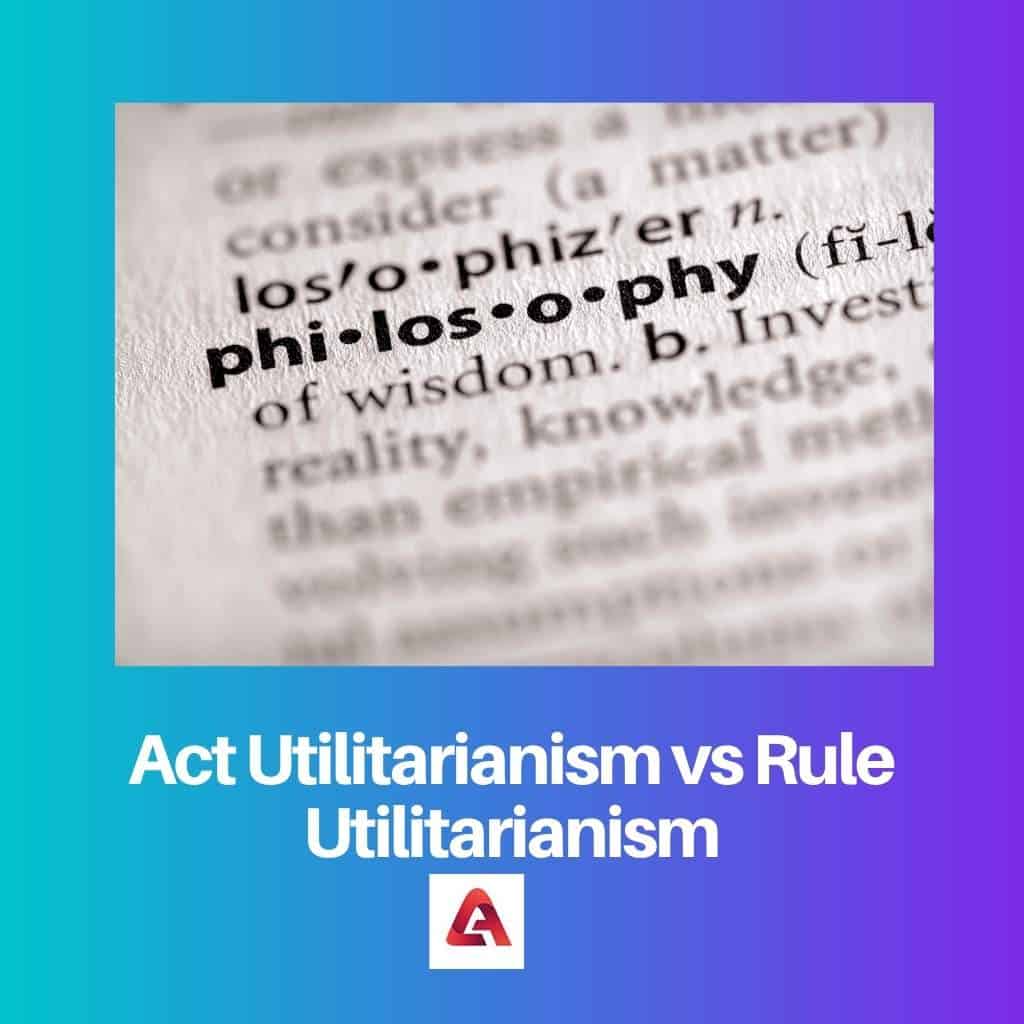Act utilitarianism is an ethical theory that judges the morality of any action by considering the consequences it leads to for everyone involved. It holds that there are no universal moral rules, and instead, each person should do what they think will produce the best overall consequences.
Rule utilitarianism, on the other hand, claims that knowledge of human nature enables us to derive a set of moral rules- “rules” as in principles or commandments – which we can follow consistently with good results.
Key Takeaways
- Act utilitarianism evaluates each action based on its utility or usefulness, while rule utilitarianism evaluates each action based on the usefulness of the rule that governs it.
- Act utilitarianism focuses on the consequences of each action, while rule utilitarianism focuses on the long-term benefits of following a certain rule.
- Act utilitarianism allows for flexibility in decision-making, while rule utilitarianism provides a clear and consistent guideline for decision-making.
Act Utilitarianism vs Rule Utilitarianism
Act utilitarianism considers only the results of a single act, while rule utilitarianism considers the consequences which follow a rule of conduct. Act utilitarianism says an act is wrong but can be done if it adds to utility, whereas rule utilitarianism says that cheating is immoral.

Act utilitarianism, also called rule utilitarianism, seeks to promote the best overall consequences by looking at how people act and what results those actions bring about. Act utilitarians would do anything that was necessary for each individual to have as much utility or happiness as possible, even if it meant telling a lie.
Rule utilitarianism, on the other hand, considers what would happen if everyone acted in a certain way. This is why rule utilitarianism looks at long-term consequences and not just immediate ones.
The rule utilitarians believe that people should keep their promises because breaking promises destroy trust, which is essential for society to function well.
Comparison Table
| Parameters of Comparison | Act Utilitarianism | Rule Utilitarianism |
|---|---|---|
| Definition | Act utilitarianism is a philosophy that judges the morality of an action based on its immediate consequences, without concern for future or long-term effects. | Rule utilitarianism is similar but considers not just whether the outcome was good or bad but also how likely it was that action would produce a good outcome. |
| Intent | Act utilitarians would be more likely to do something immediately, without much consideration for the consequences. | Rule utilitarians are less likely to take immediate action unless it is necessary and with a lot of thought put into how it will affect others. |
| Judgement | Act utilitarians would judge an event by its immediate benefits for oneself or others but not take into account what might happen as a result of this action in the future. | Rule utilitarians, however, are more likely to think about how their actions will affect themselves and those around them in the long run. |
| Actions | Act utilitarians would need to take into account the immediate physical consequences of their actions and not worry about other effects that might occur in the future or how it will affect those around them. | Rule utilitarianism is more likely to help someone else if they are currently suffering from a terrible injury or if someone is happy and content, but they will not do anything to help them if they are suffering. |
| Rules | Act utilitarians would need a rule that always helps others in the same way every time it’s followed. For instance, providing food for people who want it may be an act utilitarian action. | A rule utilitarian would need a more specific rule, such as “always provide food for people who want it.” |
What is Act Utilitarianism?
Act utilitarianism is a moral philosophy that judges the morality of an action based on its consequences. This means that act utilitarians will do anything possible to bring about the greatest amount of happiness for each individual, even if it means telling lies or breaking promises to do so.
A more extreme version of act utilitarianism is called “utilitarian terrorism.” This philosophy advocates a terrorist’s acts, no matter how violent or destructive, if they ultimately create the most happiness for each individual within their society.
Act utilitarianism is focused on maximizing the amount of happiness for each individual. In this way, it ensures that no one person’s needs take precedence over another’s and everyone has equal opportunities to be happy.
This philosophy also promotes innovation through trial-and-error experience. Act utilitarians are careful not to cling too hard to any particular idea and instead want to examine all possible options in order to make the best decision for each circumstance.
This ideology is very difficult because it requires immediate analysis without any long-term planning or consideration, which may be impractical when making decisions that affect many people. There are also ethical debates about whether or not this philosophy is best for society.

What is Rule Utilitarianism?
Rule Utilitarianism is a way of thinking which has the goal to create and distribute happiness as evenly as possible for everyone in society. This philosophy promotes fairness, tolerance, responsibility, liberty, and individual rights.
Rule utilitarianism also believes that people have different opportunities to be happy in different circumstances and recognizes that the best way to maximize happiness is by balancing what is good for one person with what is fair or beneficial for everyone.
Rule Utilitarianism policies will be based on moral absolutes, such as upholding all of our individual rights as humans. It also follows that if something does not harm others in society, then it is acceptable.
Rule utilitarianism can, at times, be very difficult to balance, as some people might see a necessary action that would be beneficial for the greater good and others in society, but it could also hurt or limit an individual’s rights.
Rule utilitarianism is easy to understand. It includes protection for individual rights. Its focus on fairness can provide better options than act utilitarianism.
Determining what moral absolutes are for an entire society or community might be challenging and controversial. As well, providing protection for individual rights can be limited to the greater good of society.

Main Differences Between Act and Rule Utilitarianism
- Act utilitarianism operates by considering what would be best for everyone in an entire community, including all different perspectives at any given time. Rule utilitarianism is a moral theory that focuses on fairness. It recognizes individual rights to avoid the greater good of society are compromised for one or more people within society.
- Act utilitarianism doesn’t care about what happens to an individual person as long as the greater good of society is achieved. Rule utilitarianism is best when it comes to issues involving a conflict between the rights of an individual and the needs/wants of society.
- Act utilitarianism focuses on how an action will affect everyone else in society and not just one or two people that are involved. Rule utilitarianism does not want anyone person’s rights violated, even if that means that everyone else in society must suffer as well.
- Act utilitarianism, as its name suggests, focuses on a particular act within society. It doesn’t care about an individual’s rights or needs in any way; it only cares about how that action will affect everyone else in society. Rule utilitarianism considers what would happen if we made that rule law and applied it to everyone in society.
- Act utilitarianism does not consider the consequences of its actions, but rule utilitarianism considers both. Rule utilitarians care about ensuring everyone has their rights and needs met; act utilitarians do not bother with those things as they only focus on one action at a time.

The comprehensive overview of act utilitarianism offered in the article is incredibly insightful, highlighting the complex nuances of this ethical philosophy.
Absolutely, Ereynolds. The depth of insight provided by the article enriches our understanding of act utilitarianism and its ethical implications.
The distinction between act and rule utilitarianism in terms of actions and rules showcases the diverse ethical considerations involved in decision-making processes.
I completely agree, Vmitchell. The application of these nuances to real-life scenarios offers significant depth to ethical analysis and decision-making.
Well articulated, Vmitchell. Understanding how these theories translate into actions and rule-making is essential for comprehensive ethical deliberation.
The implications of act and rule utilitarianism are intriguing, highlighting the need for thoughtful consideration and ethical reflection in decision-making processes.
Absolutely, Abaker. Examining these implications enriches ethical consciousness and encourages deeper reflection in ethical dilemmas.
The concept of ‘utilitarian terrorism’ in act utilitarianism underscores the extreme nature of the approach, leading to critical considerations of ethical boundaries and moral implications.
I share your concern, Tony. It’s crucial to critically assess such extreme applications of act utilitarianism and their ethical implications in society.
This comparison table provides a comprehensive overview of the key differences between act and rule utilitarianism, making it easier to analyze their respective implications.
Absolutely, Leo. Having a clear, concise comparison table helps to clarify the distinct factors that shape these ethical philosophies.
This is a very interesting debate between act utilitarianism and rule utilitarianism, highlighting the benefits and potential drawbacks of each approach.
I agree, both theories have their strengths and weaknesses, and it’s fascinating to see how they can apply to different ethical dilemmas.
Absolutely, understanding the nuanced differences between act and rule utilitarianism provides valuable insight into ethical decision-making.
The underlying intent and judgment aspects of act and rule utilitarianism underscore the breadth of ethical considerations involved, offering valuable perspectives on moral philosophies.
Well stated, Darren. Analyzing the core elements of these ethical philosophies provides a comprehensive understanding of ethical decision-making.
Examining the intent and judgement aspects of both act and rule utilitarianism really sheds light on how these philosophies guide ethical behavior.
Well said, Dan. It’s crucial to understand the implications of these theories on different levels of decision-making and action.
I found that particularly thought-provoking as well, Bennett. The intent behind actions and the long-term judgment methods make a significant difference in ethical considerations.
The implications of act utilitarianism in promoting equality and innovation are intriguing, emphasizing the broader societal influences of this ethical philosophy.
Indeed, Isabel. Understanding how act utilitarianism shapes equality and drives innovation provides valuable insights into its societal impact.
I’m really enjoying the thorough exploration of act and rule utilitarianism, shedding light on the intricate nature of ethical theories and their implications.